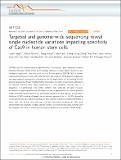| dc.contributor.author | Yang, Luhan | en_US |
| dc.contributor.author | Grishin, Dennis | en_US |
| dc.contributor.author | Wang, Gang | en_US |
| dc.contributor.author | Aach, John | en_US |
| dc.contributor.author | Zhang, Cheng-Zhong | en_US |
| dc.contributor.author | Chari, Raj | en_US |
| dc.contributor.author | Homsy, Jason | en_US |
| dc.contributor.author | Cai, Xuyu | en_US |
| dc.contributor.author | Zhao, Yue | en_US |
| dc.contributor.author | Fan, Jian-Bing | en_US |
| dc.contributor.author | Seidman, Christine | en_US |
| dc.contributor.author | Seidman, Jonathan | en_US |
| dc.contributor.author | Pu, William | en_US |
| dc.contributor.author | Church, George | en_US |
| dc.date.accessioned | 2015-04-01T15:30:30Z | |
| dc.date.issued | 2014 | en_US |
| dc.identifier.citation | Yang, L., D. Grishin, G. Wang, J. Aach, C. Zhang, R. Chari, J. Homsy, et al. 2014. “Targeted and genome-wide sequencing reveal single nucleotide variations impacting specificity of Cas9 in human stem cells.” Nature Communications 5 (1): 5507. doi:10.1038/ncomms6507. http://dx.doi.org/10.1038/ncomms6507. | en |
| dc.identifier.issn | 2041-1723 | en |
| dc.identifier.uri | http://nrs.harvard.edu/urn-3:HUL.InstRepos:14351304 | |
| dc.description.abstract | CRISPR/Cas9 has demonstrated a high-efficiency in site-specific gene targeting. However, potential off-target effects of the Cas9 nuclease represent a major safety concern for any therapeutic application. Here, we knock out the Tafazzin gene by CRISPR/Cas9 in human-induced pluripotent stem cells with 54% efficiency. We combine whole-genome sequencing and deep-targeted sequencing to characterise the off-target effects of Cas9 editing. Whole-genome sequencing of Cas9-modified hiPSC clones detects neither gross genomic alterations nor elevated mutation rates. Deep sequencing of in silico predicted off-target sites in a population of Cas9-treated cells further confirms high specificity of Cas9. However, we identify a single high-efficiency off-target site that is generated by a common germline single-nucleotide variant (SNV) in our experiment. Based on in silico analysis, we estimate a likelihood of SNVs creating off-target sites in a human genome to be ~1.5–8.5%, depending on the genome and site-selection method, but also note that mutations might be generated at these sites only at low rates and may not have functional consequences. Our study demonstrates the feasibility of highly specific clonal ex vivo gene editing using CRISPR/Cas9 and highlights the value of whole-genome sequencing before personalised CRISPR design. | en |
| dc.language.iso | en_US | en |
| dc.publisher | Nature Pub. Group | en |
| dc.relation.isversionof | doi:10.1038/ncomms6507 | en |
| dc.relation.hasversion | http://www.ncbi.nlm.nih.gov/pmc/articles/PMC4352754/pdf/ | en |
| dash.license | LAA | en_US |
| dc.title | Targeted and genome-wide sequencing reveal single nucleotide variations impacting specificity of Cas9 in human stem cells | en |
| dc.type | Journal Article | en_US |
| dc.description.version | Version of Record | en |
| dc.relation.journal | Nature Communications | en |
| dash.depositing.author | Yang, Luhan | en_US |
| dc.date.available | 2015-04-01T15:30:30Z | |
| dc.identifier.doi | 10.1038/ncomms6507 | * |
| dash.authorsordered | false | |
| dash.contributor.affiliated | Yang, Luhan | |
| dash.contributor.affiliated | Homsy, Jason | |
| dash.contributor.affiliated | Seidman, Jonathan | |
| dash.contributor.affiliated | Aach, John | |
| dash.contributor.affiliated | Seidman, Christine | |
| dash.contributor.affiliated | Church, George | |


